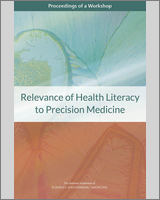NCBI Bookshelf. A service of the National Library of Medicine, National Institutes of Health.
On January 20, 2015, President Obama announced the Precision Medicine Initiative (PMI) in his State of the Union address. The PMI, by developing new approaches for detecting, measuring, and analyzing a wide range of biomedical information including molecular, genomic, cellular, clinical, behavioral, physiological, and environmental parameters, is intended to enable a new era of medicine in which researchers, providers, and patients work together to develop individualized care. Part of this effort included the creation of a national, large-scale research participant group, or cohort. The PMI Cohort Program is aimed at extending precision medicine to many diseases, including both rare and common diseases such as diabetes, heart disease, Alzheimer's disease, obesity, and mental illnesses such as depression, bipolar disorder, and schizophrenia, by building a national research cohort of 1 million or more U.S. participants.
An important challenge to assembling the PMI Cohort will be to reach individuals who are socioeconomically disadvantaged. Individuals who are socioeconomically disadvantaged have lower health literacy; often belong to racial, ethnic, and minority communities; and are often less likely to participate in research studies and biorepositories. To explore possible strategies and messaging designs, the Roundtable on Health Literacy formed an ad hoc committee charged with planning and conducting a 1-day public workshop on the intersection of health literacy and precision medicine. The workshop participants discussed a variety of topics including an overview of precision medicine and its potential, the relevance of health literacy to the success of precision medicine efforts, and perspectives and understanding of different groups, such as health care providers, consumers, and insurers. This publication summarizes the presentations and discussions from the workshop.
Contents
- The National Academies of SCIENCES • ENGINEERING • MEDICINE
- PLANNING COMMITTEE ON INTEGRATING HEALTH LITERACY, CULTURAL COMPETENCY, AND LANGUAGE ACCESS SERVICES
- ROUNDTABLE ON HEALTH LITERACY
- Reviewers
- In Memoriam
- Acknowledgments
- Acronyms and Abbreviations
- 1. Introduction
- 2. Genetic Literacy
- 3. The Intersection of Health Literacy and Precision Medicine
- 4. Health Literacy in Precision Medicine Research
- 5. Communicating Risk and Uncertainty in the Clinical Setting
- 6. Communicating with the Public
- 7. Reflections on the Day
- References
- APPENDIXES
Rapporteur: Joe Alper.
Suggested citation:
National Academies of Sciences, Engineering, and Medicine. 2016. Relevance of health literacy to precision medicine: Proceedings of a workshop. Washington, DC: The National Academies Press. doi: 10.17226/23592.
- NLM CatalogRelated NLM Catalog Entries
- Laying Anchor: Inserting Precision Health into a Public Health Genetics Policy Course.[Healthcare (Basel). 2018]Laying Anchor: Inserting Precision Health into a Public Health Genetics Policy Course.Modell SM, Citrin T, Kardia SLR. Healthcare (Basel). 2018 Aug 3; 6(3). Epub 2018 Aug 3.
- Review Relevance of Health Literacy to Precision Medicine: Workshop in Brief[ 2016]Review Relevance of Health Literacy to Precision Medicine: Workshop in BriefRoundtable on Health Literacy, Board on Population Health and Public Health Practice, Health and Medicine Division, National Academies of Sciences, Engineering, and Medicine. 2016 Jun 8
- NIH Precision Medicine Initiative: Implications for Diabetes Research.[Diabetes Care. 2016]NIH Precision Medicine Initiative: Implications for Diabetes Research.Fradkin JE, Hanlon MC, Rodgers GP. Diabetes Care. 2016 Jul; 39(7):1080-4.
- Opportunities for the Cardiovascular Community in the Precision Medicine Initiative.[Circulation. 2016]Opportunities for the Cardiovascular Community in the Precision Medicine Initiative.Shah SH, Arnett D, Houser SR, Ginsburg GS, MacRae C, Mital S, Loscalzo J, Hall JL. Circulation. 2016 Jan 12; 133(2):226-31.
- Review Integrating Health Literacy, Cultural Competence, and Language Access Services: Workshop Summary[ 2016]Review Integrating Health Literacy, Cultural Competence, and Language Access Services: Workshop SummaryRoundtable on Health Literacy, Board on Population Health and Public Health Practice, Health and Medicine Division, National Academies of Sciences, Engineering, and Medicine. 2016 Jul 14
- Relevance of Health Literacy to Precision MedicineRelevance of Health Literacy to Precision Medicine
- LY6E lymphocyte antigen 6 family member E [Homo sapiens]LY6E lymphocyte antigen 6 family member E [Homo sapiens]Gene ID:4061Gene
Your browsing activity is empty.
Activity recording is turned off.
See more...
